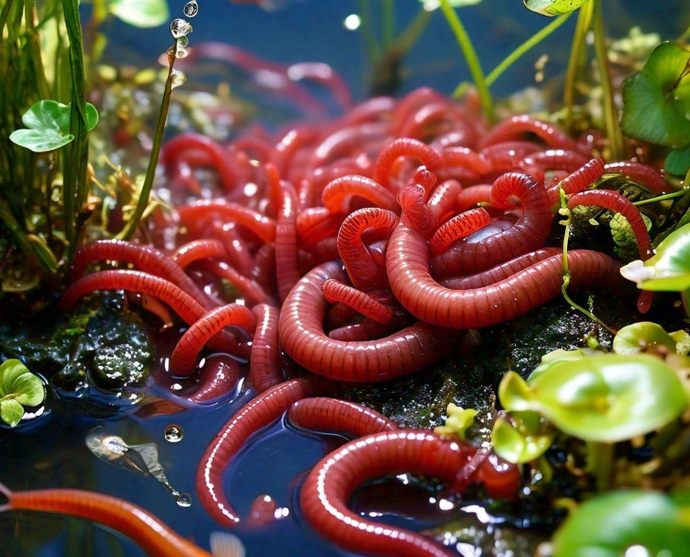Boost Dirt Wellness Naturally With Red Wigglers
The integration of red wigglers into dirt monitoring techniques presents an engaging method for boosting dirt health and wellness naturally. These earthworms not just change natural waste right into beneficial vermicompost, yet their all-natural behaviors likewise advertise boosted dirt structure, oygenation, and vitamins and mineral availability. Nevertheless, recognizing the complexities of setting up and preserving a successful vermicomposting system is vital to totally leverage their benefits. Checking out the crucial steps and potential difficulties entailed can dramatically influence the performance of this sustainable strategy. What essential facets should be taken into consideration to take full advantage of the benefits of these amazing decomposers?
Advantages of Red Wigglers

Moreover, red wigglers improve soil structure by creating channels as they burrow with the earth. This activity enhances aeration and drainage, helping with root development and making certain that plants receive ample oxygen and moisture. In addition, the spreadings generated by red wigglers are high in nutrients such as nitrogen, phosphorus, and potassium, which are important for plant development.
Red wigglers additionally help in the decrease of dangerous microorganisms and insects by outcompeting them for sources, better adding to a much healthier soil atmosphere. Their existence can lead to a reduction in the need for artificial fertilizers and chemicals, promoting sustainable agricultural methods. Overall, incorporating red wigglers right into dirt monitoring strategies gives a natural and effective ways of boosting soil vitality, consequently sustaining durable plant development and agricultural performance.
Establishing Vermicomposting
Developing a vermicomposting system is a practical means to harness the impressive advantages of red wigglers in enhancing soil health and wellness. red wigglers. To start, pick an ideal container-- preferably, a plastic or wooden container with a lid to keep wetness and temperature. The container should have drainage holes to prevent excess water buildup
Following, prepare bed linen material, which acts as a habitat for the worms. Appropriate products consist of shredded paper, cardboard, or coconut coir. Go for a deepness of 4-6 inches to offer ample area for the worms.
Once the bed linen remains in location, introduce the red wigglers, generally at a proportion of one extra pound of worms for every single square foot of surface area in the bin. Following this, include cooking area scraps such as vegetables and fruit peels, coffee grounds, and crushed eggshells. Prevent meat, milk, and oily foods, as these can bring in bugs.
Caring for Your Worms
Maintaining the well-being of your red wigglers is crucial for a successful vermicomposting system. Correct care makes certain that these helpful microorganisms can effectively damage down organic matter and enhance your soil. Begin by offering an appropriate habitat; a well-ventilated bin with a wet, dark setting is critical. Go for a bedding product that consists of shredded paper, cardboard, or coconut coir, which must be maintained moist however not saturated.
Feeding your worms is another crucial element of their care. Red wigglers flourish on kitchen area scraps such as fruit and vegetable peels, coffee premises, and smashed eggshells.
Temperature level monitoring is crucial; worms like a variety of 55 to 77 degrees Fahrenheit. Make sure the bin is not subjected to guide sunshine or extreme cold. Routinely examine for signs of distress, such as excessive worm migration or unusual smells, to deal with any type of potential issues without delay. By adhering to these standards, you will foster a healthy and balanced ecological community for your red wigglers.
Utilizing Worm Spreadings in Dirt
Worm castings, typically referred to as "black gold," are a powerful change that can dramatically boost soil health and fertility. red wigglers. These nutrient-rich, organic fertilizers are produced by red wigglers throughout their food digestion process, leading to a finely textured material that is beneficial for plants and dirt alike
Integrating worm spreadings into your soil improves its framework, boosting aeration and water retention. This is especially beneficial for sandy dirts that drain too rapidly, as well as hefty clay soils that can become compressed. Worm spreadings are replete with crucial nutrients, consisting of nitrogen, phosphorus, and potassium, which are important for plant growth.

Inevitably, using worm spreadings promotes a thriving ecosystem within the dirt, resulting in much healthier plants and more lasting horticulture methods.
Tips for Successful Composting
Successful composting calls for mindful interest to a few essential concepts that can considerably boost the high quality of the end product. Balance is essential; maintain an appropriate ratio of eco-friendly materials (nitrogen-rich) to brown materials (carbon-rich), ideally around 1:3. This equilibrium helps with efficient decay and reduces smells.
Second, oygenation plays an essential function. Frequently turning the garden compost pile boosts oxygen circulation, which speeds up microbial activity and rates up the composting process. Goal for a heap size of a minimum of 3 feet by three feet to retain warmth, which further promotes disintegration.
Dampness web content is one more essential aspect; the compost must perspire however not soggy. A good general rule is to attain a moisture degree similar to that of a wrung-out sponge. Also much water can result in anaerobic conditions, while insufficient can slow down decay.
Lastly, check the temperature of the garden compost. A temperature these details level variety of 130 ° F to 160 ° F suggests active composting and aids kill microorganisms and weed seeds. By sticking to these principles, you will develop a nutrient-rich garden compost that supports soil health and wellness and enhances plant growth.
Conclusion
Integrating red wigglers right into gardening techniques boosts dirt wellness with natural procedures. These worms contribute to the failure of natural products, resulting in nutrient-rich vermicompost that enhances soil structure and fertility.
Comments on “Healthy red wigglers: How to begin composting”